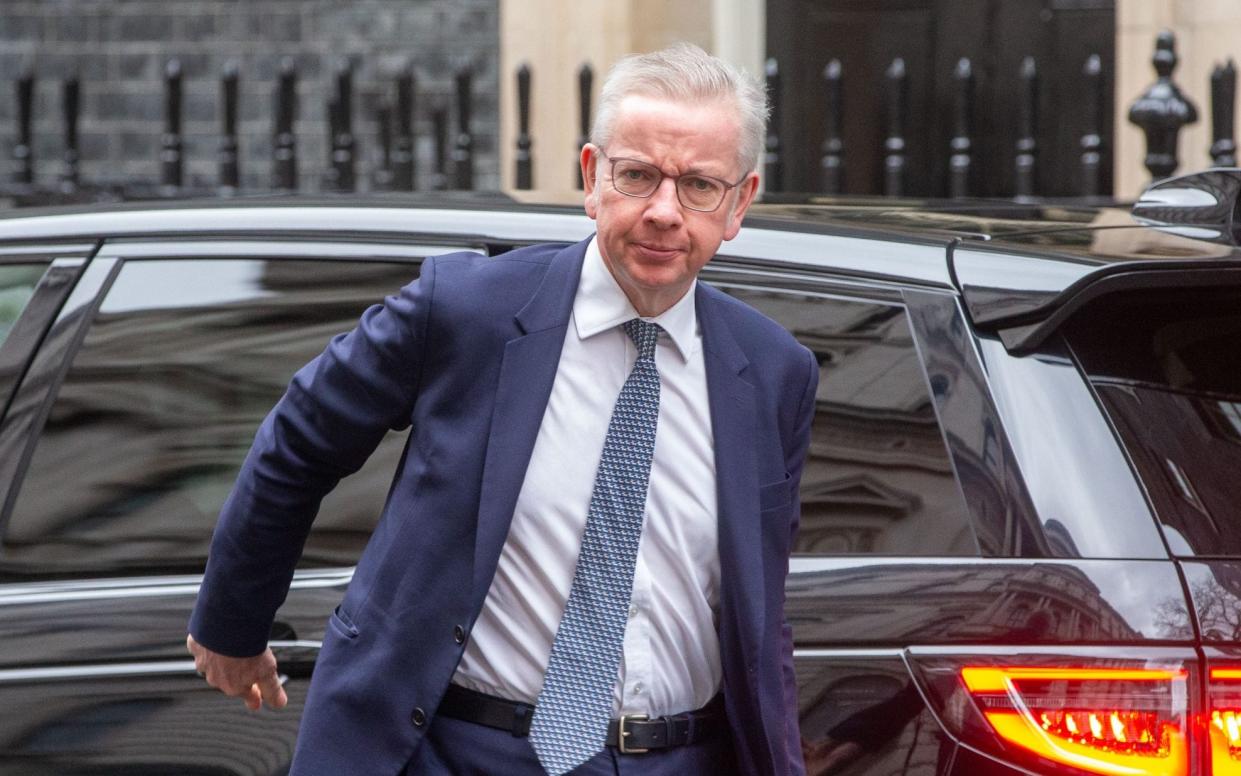Muslim groups that incite hatred to be named as extremists by Government

- Oops!Something went wrong.Please try again later.
Muslim groups that incite hatred and undermine democracy will be named and shamed as extremists by the Government, Michael Gove will announce on Thursday.
The Communities Secretary will set out a new definition of non-violent extremism which officials will use to identify and publish a list of Islamist and far-Right groups.
Officials will be instructed to cut off all Government funding and block all meetings with any of the groups to ensure they are not inadvertently giving them a “platform or legitimacy to advance extremist ideologies”.
They will be groups that fall below the terrorist threshold and so have, up until now, been free to work with Government, councils, police, health services and universities.
Ministers believe that using the new definition to identify the groups as extremist will send a signal to public bodies to think twice about working with them or employing individuals associated with them.
Officials expect to face judicial reviews by groups included on the list as there will be no right of appeal to the final decision by the Secretary of State. The Muslim Council of Britain (MCB) and Cage International told The Telegraph on Wednesday night that they were considering legal challenges if they were named.
A senior member of the MCB previously advised the police. If the group was deemed extremist by the Government, it is likely to put pressure on organisations not to work with it.
It is understood that Mr Gove is planning to name several groups on Thursday under Parliamentary privilege which protects the right of MPs to speak freely without being sued.
The moves follow a six-fold increase in anti-Semitic incidents and a four-fold jump in anti-Muslim hatred since Hamas’s terrorist attack on Israel on Oct 7.
Mr Gove said on Wednesday: “The pervasiveness of extremist ideologies has become increasingly clear in the aftermath of the 7 October attacks and poses a real risk to the security of our citizens and our democracy.
“This is the work of Extreme Right-Wing and Islamist extremists who are seeking to separate Muslims from the rest of society and create division within Muslim communities. They seek to radicalise individuals, deny people their full rights, suppress freedom of expression, incite hatred, and undermine our democratic institutions.
“Today’s measures will ensure that Government does not inadvertently provide a platform to those setting out to subvert democracy and deny other people’s fundamental rights.”
A narrower, more precise definition
The new definition is narrower and more precise than the last version which was contained in the 2011 Prevent counter-terror programme. It says that “extremism is the promotion or advancement of an ideology based on violence, hatred or intolerance”.
It states three aims deemed extremist: “To negate or destroy the fundamental rights and freedoms of others; undermine, overturn or replace the UK’s system of liberal parliamentary democracy and democratic rights; intentionally create a permissive environment for others to do so.”
The definition will cover both organisations and individuals although officials expect it to apply to groups “in the first instance.” Individuals involved with the named extremist groups could still be blocked for honours or public appointments.
Officials, supported by experts from a new counter-extremism centre of excellence in Mr Gove’s department, will investigate potential extremist groups’ activities, behaviours and pronouncements before presenting a recommendation with evidence to the Secretary of State to make the final decision on which groups are on the list.
Definition will not apply to ‘mainstream discourse’
The Government insists the definition will not stifle free speech or apply to “debate within the boundaries of mainstream discourse” such as Conservative religious views, climate change, abortion rights or gender critical issues. It is neither statutory, nor part of criminal law.
However, in an article in the The Spectator on Thursday, Toby Young, general secretary of the Free Speech Union, warned that the plan could hand a “dangerous weapon” to a Labour Government who could tweak it to “smear their political opponents”.
Detailed guidance will be published on Thursday setting out the types of behaviour and ideologies that could be captured by the definition. At the weekend, Mr Gove described chants of “From the River to the Sea” as amounting to the “legitimisation of an extremist position which intimidates and leads to hate.”
A “permissive environment” could be a group which repeatedly provides a platform to extremist speakers despite being told they meet the definition for extremism.
The 2011 definition of extremism stated that it was the “vocal or active opposition to fundamental British values, including democracy, the rule of law, individual liberty and mutual respect and tolerance of different faiths and beliefs.” It added that extremism included “calls for the death of members of our armed forces, whether in this country or overseas”.
The MCB is an umbrella body with more than 400 Muslim organisations as affiliates. The Government has already cut off contact with it. Cage International campaigns against state policies developed as part of the war on terror but has sparked controversy over its defence of the rights of terror suspects.
The MCB said it would be “offensive, ludicrous and dangerous” to suggest it fell under arbitrary definitions of extremism. “We are a democratic organisation representing a cross-section of British Muslims. We shall be monitoring developments and will seek to reserve our position legally,” it said.
Cage International said it was “extremely opposed to an establishment that is aiding livestreamed genocide abroad and imposing draconian laws at home to suppress taxpayers and citizens, who seek to express their basic humanitarian values. We will be keeping all our options open, including a legal challenge against the Government.”


